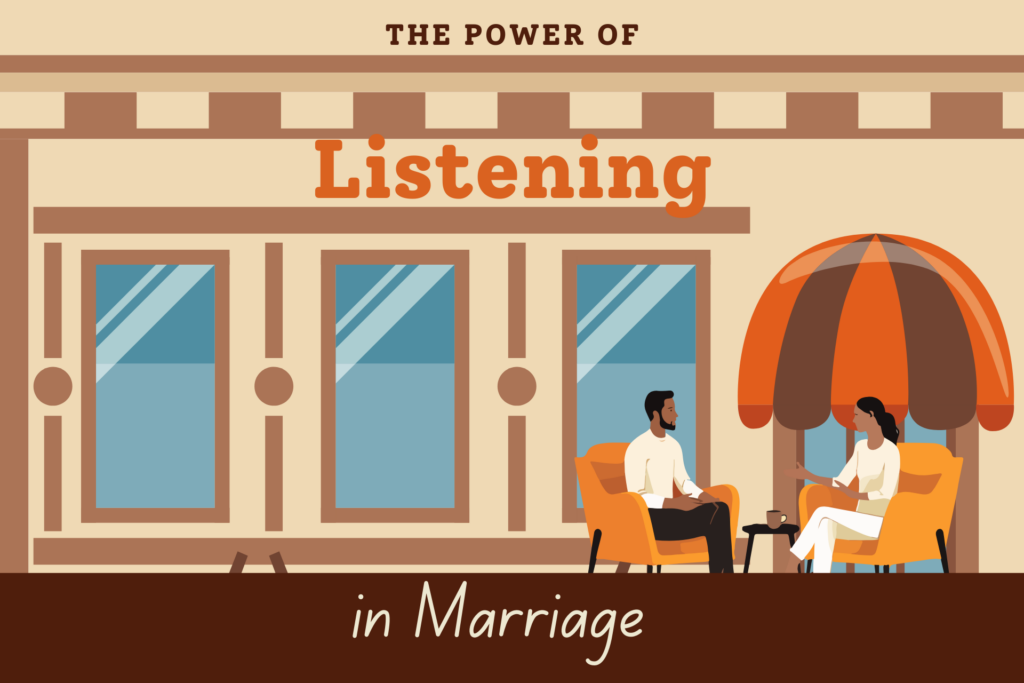I have learned the power of listening in Marriage. A few years ago, I discovered, through the process of self evaluation that I was a terrible listener. I started working at it.
Let’s be honest—most of us either think we’re great listeners or used to think we were, but the truth usually tells a different story.
We nod. We “uh-huh.” We may even pause long enough for our spouse to finish talking. But real listening? The kind that sees beneath the words and leans in with love? That’s a different level entirely.
When we learn to truly listen, we unlock a whole new depth in our marriages.
Hearing Isn’t the Same as Listening
Let’s clear this up right away: Hearing is passive. Listening is intentional.
Hearing is what you do when your spouse is talking and you’re already forming a mental grocery list.
Listening? That’s heart work. It means giving your full attention—not just to words, but to emotions, pauses, facial expressions, and even the stuff that’s not being said out loud.
It’s not easy. But it’s powerful.
Why Listening Matters So Much in Marriage
Your spouse wants to feel seen, heard, and valued. Listening does all three.
When you truly listen, you’re telling your spouse:
- “Your words matter to me.”
- “I want to understand you.”
- “I care about how you feel.”
And guess what? That kind of presence builds trust. It disarms tension. It deepens intimacy. In other words, listening is one of the most loving things you can do.
Active Listening: What It Really Looks Like
Let’s break it down a bit. Active listening is more than just being quiet while someone else talks.
It looks like:
- Maintaining eye contact
- Putting your phone down (yep, all the way down)
- Not interrupting—even when you really want to correct something
- Saying things like:
“That sounds really hard.”
“Can you tell me more about that?”
“I didn’t realize you felt that way—thank you for sharing.”
It’s the kind of listening that doesn’t rush to fix, defend, or solve. It just receives.
“Everyone should be quick to listen, slow to speak and slow to become angry.”
— James 1:19 (NIV)
This verse? It’s gold. And it gives us a framework for how to handle even tough conversations with grace and patience.
Listening Defuses Conflict (Yes, Really)
You know those arguments that spiral out of control fast? So often, it’s because one or both people aren’t feeling heard.
But when you pause and listen—like really listen—you de-escalate the heat.
That’s what Fighting Fair is all about: slowing things down, choosing humility, and making room for both voices to be heard.
When your spouse knows you’re listening without judgment or defense, they don’t have to shout to be understood.
Listening is a Key Piece of Healthy Communication
We often think of communication as “what we say,” but it’s also how well we receive what’s being said.
In Healthy Communication in Marriage, we talk about the importance of listening as the foundation for every meaningful conversation. You can have all the “right” words in the world—but if you’re not listening? It’s noise, not connection.
Good communication starts with quieting your own voice long enough to fully hear your spouse’s heart.
Listening with the Heart of Christ
One of my favorite pictures of Jesus is when He listens to people others ignore. He doesn’t cut them off. He doesn’t dismiss their pain. He makes space.
And He invites us to do the same in our marriages.
Ask God to help you listen like Jesus:
- With patience
- With compassion
- With humility
- With a desire to understand, not just respond
Sometimes your spouse doesn’t need a sermon or a solution. They just need your presence.
Practical Tips to Be a Better Listener
Let’s make this real. Try these:
Put distractions away. Yep—phones, TV, laundry, even your favorite devotional book.
Repeat back what you heard. “So what I’m hearing is…” helps your spouse feel understood.
Avoid jumping in with advice. Ask first: “Do you want me to just listen or help problem-solve?”
Notice body language. Sometimes the unspoken things speak the loudest.
Create space for honesty. Let your spouse speak freely, even if it’s uncomfortable.
Listening Is Love in Action
It’s easy to say “I love you.” But listening? That’s one of the most practical ways we live it out in marriage.
So today, choose to lean in. Ask a real question. Make eye contact. Silence your inner fixer. And just… listen.
Because when we slow down enough to really hear each other, we don’t just improve our conversations—we strengthen our entire relationship.
Want to learn how to navigate conflict with grace and grow stronger through it? Don’t miss Fighting Fair.
Or maybe you’re ready to sharpen your communication skills and build deeper connection? Head over to Healthy Communication in Marriage for practical tools and faith-filled guidance.

